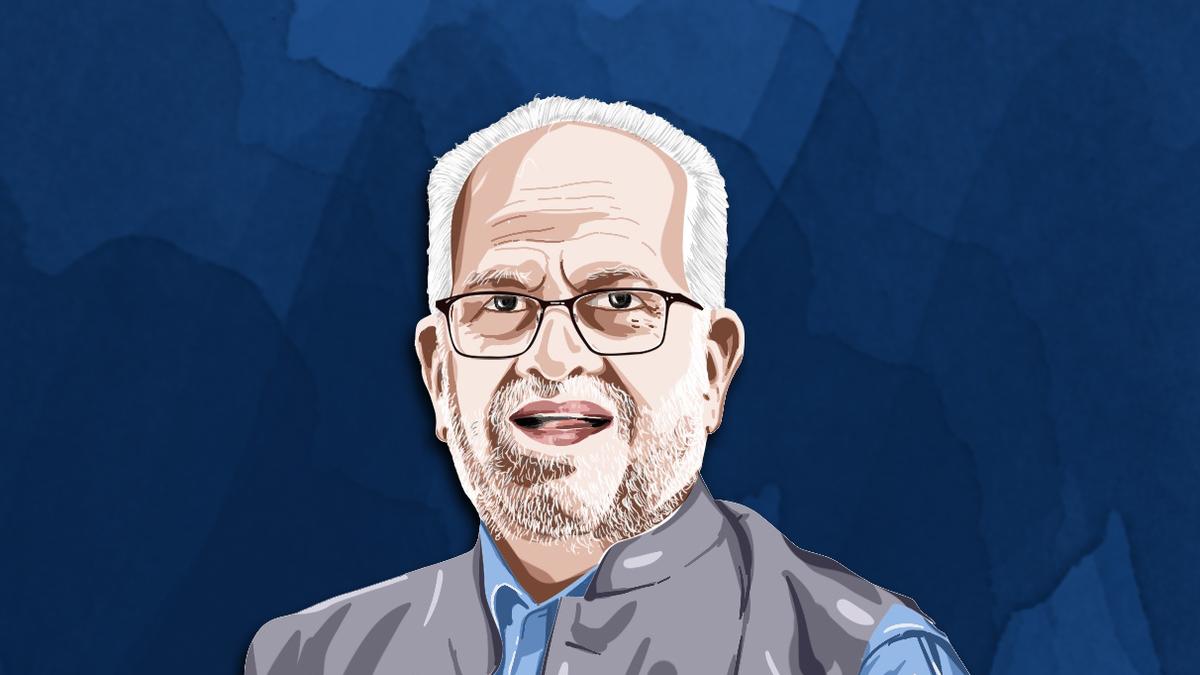B. Sudershan Reddy
| Photo Credit: Illustration: Sreejith R. Kumar
Social justice and constitutionalism were the two planks that the Opposition parties emphasised while taking on the Bharatiya Janata Party (BJP) in the 2024 Lok Sabha elections. More than a year later, the nomination of former Supreme Court judge, Justice (Retired) B. Sudershan Reddy, as the joint Opposition candidate in the coming vice-presidential polls is a reiteration of that emphasis.
“This Vice-Presidential election is not merely a contest for an office; it is an ideological battle for the soul of our nation. While the ruling party has chosen the ideology of RSS, we uphold the Constitution and its values as our guiding light,” Congress president Mallikarjun Kharge said in a read-out while announcing Justice Reddy’s name formally at a press conference. The Opposition parties have pitched the vice-presidential elections as one that will see a contest between a person who has always espoused the cause of the Constitution and NDA’s candidate, C.P. Radhakrishnan, a veteran RSS activist from Tamil Nadu, who has served as a two-term Member of Parliament, from 1998 to 2004.
Justice Reddy, during his tenure in the Supreme Court between 2007 and 2011, had often been cited as a judge who combined constitutional idealism with a hard insistence on accountability. In Nandini Sundar & Ors. versus State of Chhattisgarh (2011) — better known as the Salwa Judum case — he wrote that arming tribal youth as Special Police Officers to fight Maoists violated the Constitution’s guarantee of dignity, equality and the rule of law. The Court directed the State-armed vigilante groups to be disbanded, signalling that counter-insurgency cannot come at the cost of civil liberties.
Also Read | Will write to all MPs urging them to consider my candidature: Sudershan Reddy
“Tax breaks for the rich, and guns for the youngsters amongst poor, so that they keep fighting amongst themselves, seems to be the new mantra from the mandarins of security and high economic policy of the State. This, apparently, is to be the grand vision for the development of a nation that has constituted itself as a sovereign, secular, socialist and democratic republic,” the July 5, 2011, order, authored by Justice Reddy along with Justice (Retired) S.S. Nijjar, noted.
The judgement has once again come into focus with Union Home Minister Amit Shah accusing the former judge of being soft on Naxalism. Mr. Shah asserted that if the Salwa Judum judgment had not come, Left-wing extremism in the country would have been eliminated before 2020. Though he did not publicly join issues with the Home Minister, Justice Reddy asserted that the Supreme Court never asked the state to stop its fight against the Naxals but stated that the State cannot “outsource” its duty to protect its citizens. Another significant ruling that Justice Reddy authored was in the Ram Jethmalani & Ors. versus Union of India (2011), blasting governmental inertia on black money. The judgment created a Special Investigation Team to track illicit funds abroad and treated financial opacity as “a constitutional failure rather than a mere policy gap”.
Focus on equity
The most recent public role that the 79-year-old judge took up was to head the 11-member independent expert working group (IEWG) that had analysed and interpreted the data collected during the Telangana Congress government’s Socio, Economic, Education, Employment, Political and Caste (SEEEPC) Survey 2024. Over several months, Justice Reddy and his colleagues analysed the raw data to develop a Composite Backwardness Index and map deprivation patterns with precision. The group’s nearly 300-page report — submitted to Chief Minister A. Revanth Reddy in July 2025 — has become the foundation for major social-justice initiatives.
By quantifying disadvantage down to the sub-caste level across Scheduled Castes, Scheduled Tribes and Backward Classes, the IEWG had suggested a scientific framework to calibrate welfare benefits and fine-tune reservations in local bodies.
The recommendations also provide a legal vetting for legal limits as to how far the State can go without inviting judicial reversal. Unlike adjudicating adversarial disputes in a courtroom, the Telangana assignment required building consensus around data, crafting policy pathways and anticipating constitutional hurdles before they arise.
The assignment, to use an earlier quote of Justice Reddy, was an effort in “turning evidence into equity”.
A career jurist from undivided Andhra Pradesh, Justice Reddy first served on the Andhra Pradesh High Court Bench and later as Chief Justice of the Gauhati High Court before his elevation to the Supreme Court. After leaving the Bench, Justice Reddy briefly served as the first Lokayukta of Goa.
Justice Reddy’s career underlines his consistency of holding power to account: whether it is the exercise of that power in conflict zones, the economic elite hiding wealth offshore, or a government allocating welfare benefits to its citizens.
Published – August 31, 2025 01:49 am IST
